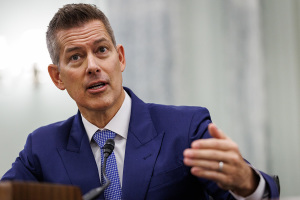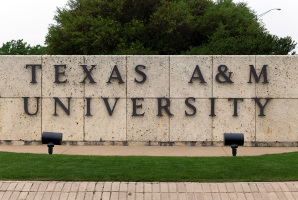Why the Christian Right Loves Sarah Palin
"A genuine reformer. A deeply committed Christian. If I went into the polling booth today, I would pull the lever for John McCain." — James Dobson, founder of Focus on the Family, on Gov. Sarah Palin being named the Republican vice-presidential candidate
The Christian Right, despondent at the prospect of losing access to the White House when George W. Bush exits in January 2009, seems to have found itself a new savior in the form of Sarah Palin, the Republican vice-presidential candidate.
But why is the Christian Right so excited about a woman whose name, a few weeks ago, most would have been hard pressed to recognize? Sure, she's pro-life, pro-war and pro-gun (whatever all that means). Most of all, however, she is a fundamentalist Christian who most likely has been influenced by a strident, apocalyptic form of Pentecostalism. In fact, according to the Associated Press, Palin was baptized in a Pentecostal Assemblies of God church as a teen and attended that church until 2002. There's no way a person could spend more than 20 years in a church and not be impacted by its theology. And that's where legitimate questions arise.
Those who subscribe to an apocalyptic vision basically long for the end of the world and all the violence and bloodshed that comes with it so that Jesus will come back. This could prove to be a dangerous tendency in someone with the power to make war.
This isn't to suggest that voters should write Palin off simply because of her religious affiliation. It does mean that we need to know more about her views, and it's up to the media to ask the hard questions. That's their job, but I wouldn't hold your breath waiting for them to do it.
Although many leaders of the Christian Right embrace apocalyptic views, that's not why they're throwing their total support behind her. The fact is that Palin is the only hope the Christian Right has of maintaining a presence in the White House—something George W. Bush was all too eager to accommodate.
Their total support, however, shows the inherent manipulation and, thus, danger of politics. And James Dobson is a perfect case in point. Dobson, the Christian Right's single most influential figure, had declared that he could not—and would not—support John McCain's nomination. However, with Palin as the Republican nominee, McCain is now assured of the support of the movement that once opposed his candidacy.
The electoral might of the Christian Right cannot be underestimated. Religion has often shown itself to be the best predictor of how people will vote. At stake are approximately 18 million evangelical adults. Moreover, 19% of registered Republicans identify themselves as evangelical Christians.
Determined to use politics to advance their agendas, the leaders of the Christian Right have no qualms about turning churches across the country into political headquarters. But what good has it done? After nearly eight years of the Bush presidency, not only is the country devastated both morally and economically, the leaders of the Christian Right are left groveling for a few last-minute scraps thrown from John McCain's table. As Frank Schaeffer, one of the founders of the Christian Right who has now renounced it, writes, "In 2000, we elected a president who claimed he believed God created the earth and who, as president, put car manufacturers and oil companies' interests ahead of caring for that creation. We elected a pro-life Republican Congress that did nothing to actually care for pregnant women and babies. And they took their sincere evangelical followers for granted, and played them for suckers."
Like moths flickering about a hot flame, the leaders of the Christian Right are eager to get close to political power. But as anyone who has played the game knows, politics is corrupt and manipulative. And the Christian Right was manipulated by the Bush Administration.
One such person who should know this is David Kuo, who served as Special Assistant to President Bush from 2001-2003. In his book Tempting Faith, Kuo describes the way in which the Bush Administration manipulated Christians: "Rove's Public Liaison office had a religious outreach team in constant contact with evangelical and social conservative groups about every facet of the president's policy and political agenda. As part of their outreach they held weekly—or more often, as necessary—conference calls to update that community on events and announcements while simultaneously soliciting their feedback."
Kuo continues, "This network of people covered virtually every area of evangelical Christianity. The calls began with an overview of what the president would be talking about in the coming week. If necessary, participants were asked to talk to their people about whatever issue was pending. Talking points were distributed and advice was solicited. That advice rarely went much further than the conference call. There wasn't any malice or negligence behind this. It was just that the true purpose of these calls was to keep prominent social conservatives and their groups or audiences happy. In most ways it wasn't a tough sell."
In fact, Kuo says, it wasn't difficult to convince Christians that President Bush was on the right side of virtually any tactic. "It should have been a whole lot harder because Christians should have demanded a whole lot more. But all too often, when put before power, Christian leaders wilt." In McCain's case, the Christian Right has already wilted.
Thus, we get to the heart of the problem. Genuine religion has never attempted to merge with politics. If it attempts to influence politics at all, it's by speaking truth to power and acting as a moral compass for society. In fact, the Christian Right does Christianity a disservice. It greatly misrepresents its founder, Jesus Christ, who rejected politics as the solution for what ails us. Read the Sermon on the Mount (Matthew 5) for a clear sense of his priorities. To Jesus, religion was all about helping the poor, showing mercy (even to your enemies) and being a peacemaker—not a warmaker. He did not bless the powerful. Rather, Jesus said, "Blessed are the meek."
Neither did Jesus seek political favors or power. He was apolitical and anti-politics. In fact, Jesus had a tendency to attack and undermine political power. He had no qualms about getting in politicians' faces, so to speak. Even with his back ripped open and bleeding, Jesus stood before Pilate, the man who had the power of life and death over him, and spoke truth to power: "You could have no power over me if it were not given you from above."
Jesus understood that the legitimate use of power does not include using it to impose one's will upon others. From the Christian standpoint, the proper use of power is to seek justice for all.
The Christian Right leaders have sacrificed their principles to the false idol of politics. In the process, they have sold their souls for a bowl of political porridge. As C. S. Lewis once wrote, "He who surrenders himself without reservation to the temporal claims of a nation, or a party, or a class is rendering to Caesar that which, of all things, most emphatically belongs to God: himself."





























